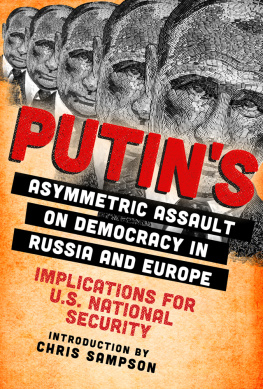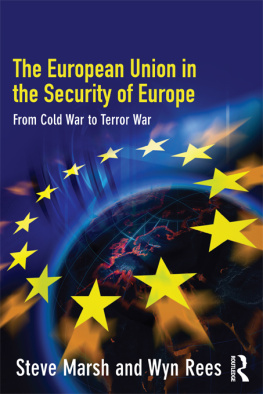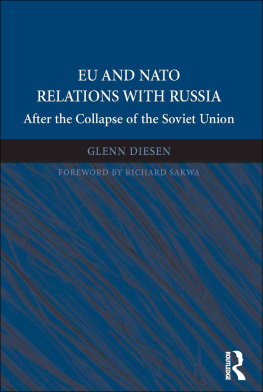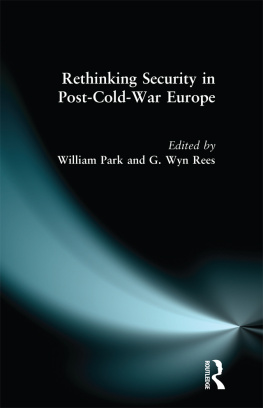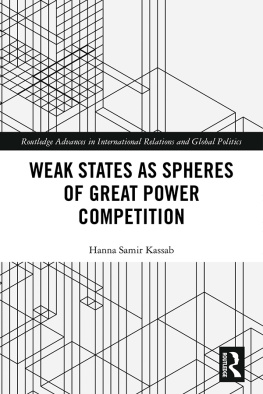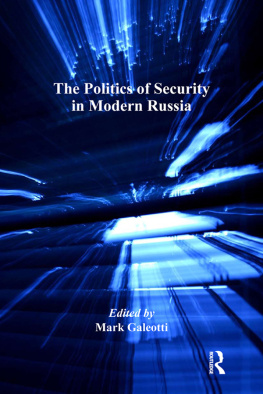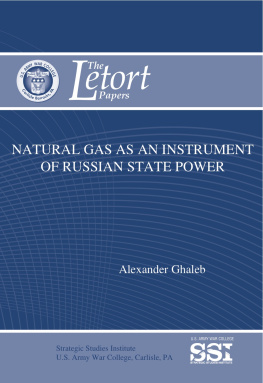MEDVEDEVS PLAN:
GIVING RUSSIA A VOICE BUT NOT A VETO
IN A NEW EUROPEAN SECURITY SYSTEM
Richard J. Krickus
December 2009
The views expressed in this report are those of the author and do not necessarily reflect the official policy or position of the Department of the Army, the Department of Defense, or the U.S. Government. Authors of Strategic Studies Institute (SSI) publications enjoy full academic freedom, provided they do not disclose classified information, jeopardize operations security, or misrepresent official U.S. policy. Such academic freedom empowers them to offer new and sometimes controversial perspectives in the interest of furthering debate on key issues. This report is cleared for public release; distribution is unlimited.
*****
This publication is subject to Title 17, United States Code, Sections 101 and 105. It is in the public domain and may not be copyrighted.
*****
This manuscript was funded by the U.S. Army War College External Research Associates Program. Information on this program is available on our website, www.StrategicStudiesInstitute.army.mil , at the Publishing button.
*****
Early stages of this monograph were supported by a grant from the Kennan Institute, Woodrow Wilson International Center for Scholars.
*****
Comments pertaining to this report are invited and should be forwarded to: Director, Strategic Studies Institute, U.S. Army War College, 122 Forbes Ave, Carlisle, PA 17013-5244.
*****
All Strategic Studies Institute (SSI) publications are available on the SSI homepage for electronic dissemination. Hard copies of this report may also be ordered from our homepage. SSIs homepage address is: www.StrategicStudiesInstitute.army.mil .
*****
The Strategic Studies Institute publishes a monthly e-mail newsletter to update the national security community on the research of our analysts, recent and forthcoming publications, and upcoming conferences sponsored by the Institute. Each newsletter also provides a strategic commentary by one of our research analysts. If you are interested in receiving this newsletter, please subscribe on our homepage at www.StrategicStudiesInstitute.army.mil / newsletter/.
ISBN 1-58487-419-8
FOREWORD
In the summer of 2008, Russian President Dmitry Medvedev urged the West to join Moscow in creating a new European security system. The existing one no longer provided stability on the Continent; indeed, the North Atlantic Treaty Organizations (NATO) eastward expansion had created a new rancorous fault line between the West and Russia. Before Medvedevs Plan became the subject of serious discourse, the August War in Georgia erupted, and Russias aggression was cited as evidence that any notion of security coopera-tion with Moscow was a fantasy.
By the fall, however, the war was cited as a compelling reason for engaging Russia since it made little sense to isolate the largest country in Europe from any meaningful security agenda. What is more, President Barack Obama proclaimed that finding a follow-up for the Strategic Arms Reduction Treaty (START) was vital to U.S. security to prevent the spread of nuclear weapons and fissile material to rogue states and terrorist cells that might employ them against an American city. A successful outcome to the START negotiations would help reconcile other outstanding flashpoints of conflict between the West and Russia: the American anti-missile system in Eastern Europe; the issue of NATO enlargement; and resurrecting conflict management mechanisms in what Russia call-ed its near abroad, and Europe labeled its troubled neighborhood. Cooperation on other vital security issues also would be advanced: energy security, climate change, and the creation of a new global economic regime.
It is against this backdrop that Medvedevs proposal has been revisited and, while some Western analysts deem the conflicting interests and value gap that separate the West from Russia overwhelming, others argue that the time has come to engage Russia in seeking a common security agenda in Europe. That said, the most compelling question confronting those who favor a security partnership with Russia is: How to give Russia a voice but not a veto in a new European security system?
In this monograph, Dr. Richard Krickus addresses this question and provides some provocative rec-ommendations. Most specifically, he proposes that the time has come to provide Russia with a NATO Membership Action Plan (MAP) and agrees that those who argue against it remain mired in a Cold War mindset that is out of sync with todays strategic realities. Ultimately, a campaign to include Russia in NATO may fail but at the very least, the endeavor deserves serious consideration he believes. He also provides compelling reasons why U.S. defense analysts must consider several future outcomes for Russia. In addition to being the only state that is capable of devastating the United States in a nuclear exchange, most of the worlds population and resources exist on the borders of its massive territory. Its future then, will shape the global strategic environment for decades to come.

DOUGLAS C. LOVELACE, JR.
Director
Strategic Studies Institute
ABOUT THE AUTHOR
RICHARD J. KRICKUS is a Distinguished Professor Emeritus at the University of Mary Washington and had held the Oppenheimer Chair for Warfighting Strategy at the U.S. Marine Corps University. Previously he co-founded The National Center For Urban Ethnic Affairs in Washington, DC, and in the early 1970s began conducting research on the Union of Soviet Socialist Republics nationalities question. In this connection, he began to write about popular unrest among the people of Lithuania. In 1990, Sajudis, the Lithuanian popular front movement, invited him to serve as an international monitor for the first democratic election conducted in Soviet Lithuania. Dr. Krickus has offered testimony at the Senate Foreign Relations Committee and has lectured at the U.S. Foreign Service Institute, the Polish Foreign Ministry, the European Commis-sion, and other domestic and foreign venues on the Soviet Union/Russia, the Baltic countries, NATO and Kaliningrad. He has published widely on these issues for academic and policy-oriented journals as well as various newspapers, including The Washington Post , The Chicago Sun Times , The Los Angeles Times , and The Wall Street Journal Europe . For 8 years Dr. Krickus wrote a column on world affairs for Lietuvos Rytas , Lithuanias leading national daily. He has appeared as a commentator on Soviet-Russian affairs on U.S. radio and television on numerous occasions. He is the author of a number of books, including Pursuing The American Dream , The Superpowers In Crisis , Showdown: The Lithuanian Rebellion And The Break-Up Of The Soviet Empire , The Kaliningrad Question , and Iron Troikas: The New Threat From The East . Dr. Krickus holds a B.A. in government from the College of William and Mary, an M.A. in international affairs from the University of Massachusetts, and a Ph.D. in comparative politics from Georgetown University.
SUMMARY
How do we give Russia a voice but not a veto in crafting a new European security system? This question has preoccupied analysts in Brussels, Mos-cow, and Washington ever since Russian President Dmitry Medvedev proclaimed that the existing one was deeply flawed. Vladimir Putins protg observed last summer that the American unipolar moment upon which it rested was over. The United States could no longer dominate the international agenda nor could NATO do the same thing in Europe.
The purpose of this monograph is to provide insight into the problems and prospects of the United States and Europe creating a new security relationship with Russiaone that can enhance the national security of all three of them. It will be comprised of three parts. First, it will address several compelling questions: What is the Russian case for a new security system? What are the arguments in opposition to it? And why, in spite of profound reservations about cooperation with Mos-cow, are Western statesmen prepared to consider it? In this connection, the factors that prevented a nuclear


